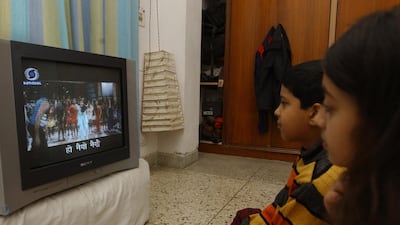In the early 2000s, a study was done in India about the impact using same-language subtitles would have on children's reading skills. This meant that captions in the same language as the content were turned on in a weekly-hour long programme of Hindi film songs broadcast nationally during prime time.
The participants included schoolchildren who couldn't read a single letter of Hindi. After five years, 70 per cent in this group who watched it weekly became functional readers. That's compared to 34 per cent in the group who didn't.
It's research like this that's inspired a new organisation to push for children's TV and video programmes to automatically display same-language subtitles in a bid to boost literacy.
A child's voice-over in a video produced by the UK advocacy group Turn on the Subtitles states it this way: "If I told you there was a magic button and when it's pressed, it doubles my chances of becoming literate – which decreases the chances of me committing a crime, and even reduces the chances of me dying early by 75 per cent – would you believe me?"
Of course, the video reveals there is no magic button at all, but instead they're referring to the simple option of turning on subtitles. It's an option that exists on almost every TV and streaming platform in households across the world.
Do subtitles really boost literacy?
There's a solid body of evidence to back it up, although the video may be overstating its impact somewhat.
"In school, we strive to ensure our learning environments are purposefully print-rich, as we know that the more students are exposed to written and printed language, the better it is for their development of reading skills," says Rebecca Tennant, deputy headteacher at Kings' School Al Barsha. "As students are now working in settings away from the classroom, it is important to promote alternative ways in which we can support them."
Taking in the subtitles – which it's been proven children tend to do when they're switched on – not only helps boost reading skills, but it also aids fluency, the ability to read with speed, accuracy and proper expression.
It can improve prosody skills, too, which includes being able to pause or put emphasis on words, so that the sentence makes more sense.
Listening to an expert read out loud while following along with the text can really help students develop their understanding of words, sentence structure, flow and overall fluency. So it makes sense that same-language subtitles can do wonders in this regard.
It's also why story time can be useful, and there are plenty of famous celebrities running those virtually at the moment, including the four-week series Mondays with Michelle Obama, as the former US first lady reads beloved children's book The Gruffalo.
There are also a few options in the UAE, including a daily session with Dubai mum Helen Farmer and another led by Reading with Dogs, in which a pooch and a human reader appear on children's screens.
There's more to reading than subtitles
It's important to realise, however, that turning on the subtitles alone isn't a quick, easy and sure-fire way to ensure a child's reading progress stays on track.
Tennant says: "We know, especially for students who are developing their early reading skills, being frequently exposed to written words, especially alongside a visual to support, develops their ability to recognise that word independently."
However, she continues, "adding subtitles to television programmes and videos is not a replacement for reading at home, merely an additional way in which we can expose children to written words".
It is at the very least a simple way to help children continue their learning while staying at home amid the coronavirus crisis.



